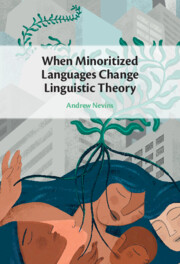Book contents
- Frontmatter
- Dedication
- Frontmatter
- Contents
- Figures
- Acknowledgments
- Abbreviations
- Map
- 1 Expanding the Canon: Minoritization in the World and in Linguistic Theory
- 2 Indexical Shift in Zazaki and Uyghur
- 3 Why Ergative Case Requires Structure in Basque and Ch’ol
- 4 Closest Conjunct Agreement in Slovenian and Xhosa
- 5 Configurationality of Objects in Chichewa and Warlpiri
- 6 Partial Nasality in Maxakalí and Kaingang
- 7 Symmetric Hands in Sign Language Phonologies
- 8 Number-Encoding on Verbs in Hiaki and Chechen
- 9 Conclusion: Towards Healthy Futures in the Language Sciences
- Bibliography
- Index
3 - Why Ergative Case Requires Structure in Basque and Ch’ol
Published online by Cambridge University Press: 18 November 2022
- Frontmatter
- Dedication
- Frontmatter
- Contents
- Figures
- Acknowledgments
- Abbreviations
- Map
- 1 Expanding the Canon: Minoritization in the World and in Linguistic Theory
- 2 Indexical Shift in Zazaki and Uyghur
- 3 Why Ergative Case Requires Structure in Basque and Ch’ol
- 4 Closest Conjunct Agreement in Slovenian and Xhosa
- 5 Configurationality of Objects in Chichewa and Warlpiri
- 6 Partial Nasality in Maxakalí and Kaingang
- 7 Symmetric Hands in Sign Language Phonologies
- 8 Number-Encoding on Verbs in Hiaki and Chechen
- 9 Conclusion: Towards Healthy Futures in the Language Sciences
- Bibliography
- Index
Summary
In this chapter, two languages spoken far apart from one another – Basque and Ch’ol – jointly show that once one considers sentences expressed in the progressive aspect, the entire theory of ergative case as lexically determined begins to unravel. In particular, verbs that are not supposed to be lexically assign ergative end up with ergative-marked subjects (and vice versa) as a result of the larger clausal structure. Ergative case cannot solely be chalked up to a semantic encoding of agentivity or volitionality of the predicates involved. It is the details of the structure wrought around such predicates that will predestine their arguments to be ergative or not.
Information
- Type
- Chapter
- Information
- When Minoritized Languages Change Linguistic Theory , pp. 26 - 41Publisher: Cambridge University PressPrint publication year: 2022
